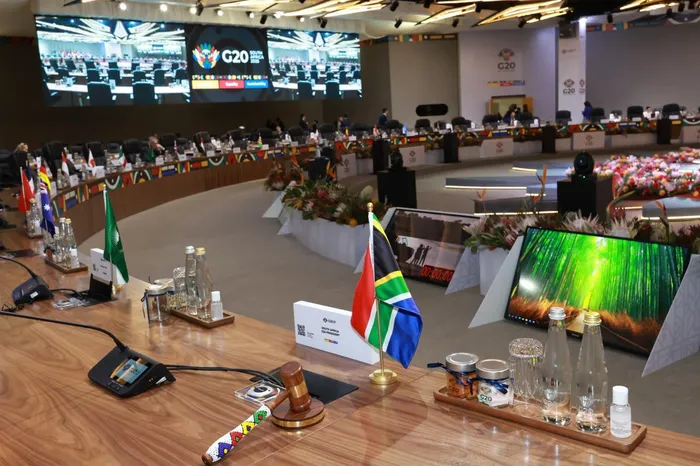
Throughout the summit, I reflected on how the G20’s processes echo the dynamics of the modern boardroom. There are differing interests, power asymmetries and, at times, absent members. There is debate over priorities and competing definitions of success, write the author.
Image: Supplied/GCIS
Nqobani Mzizi
Governance is about how people come together to make decisions that shape the future. This past weekend, South Africa reminded the world what that looks like in motion. As host of the Group of 20 (G20) Leaders Summit in Johannesburg, it brought together the world’s major economies and powerful political leaders under one roof, around a gigantic circular table, and guided by the theme Solidarity, Equality and Sustainability. What unfolded on that global stage offered more than political spectacle. It revealed a living model of governance: a system of voices, principles and processes that mirrors what happens in the boardroom.
South Africa’s presidency of the G20 spanned an entire year, during which 133 meetings were held across the Sherpa Track, the Finance Track and the Engagement Groups. Together, these forums shaped what I came to see as the global boardroom. Each committee deliberated, debated and negotiated under the guidance of the sherpas until their collective work culminated in the Leaders Declaration, the final expression of the G20’s intent. The declaration was agreed to by all attending countries except Argentina, which raised concerns about specific sections, and the United States, which was not present at the summit and withheld its endorsement. Yet, like many board resolutions, the declaration’s authority does not come from enforcement but from shared commitment. Though voluntary and non-binding, these commitments matter profoundly, for they establish direction, create expectations and frame accountability.
What struck me most was how the G20’s structure creates accountability through process, not coercion. Even though its declarations are voluntary, there is a moral pressure to comply, which can be considered a shared expectation of good faith. That sense of accountability by conscience rather than by compulsion represents the highest form of governance. It is what King V calls ethical culture, meaning behaviour guided by purpose. The G20, in its best moments, operates on that same principle: good governance endures when it is built on values.
That is the essence of governance: the art of agreeing on what should be done when no one can be compelled to do it. Its strength comes from the willingness to align, rather than the authority to enforce. In the G20, as in any boardroom, influence and alignment often outweigh authority.
The concept of the Troika, the three-nation leadership team of the current, immediate past and next G20 presidencies, offered another subtle lesson in continuity. During South Africa’s presidency, this included Brazil, South Africa and the United States. It is leadership succession in motion and a reminder that good governance carries wisdom forward, not only decisions.
This principle of continuity is symbolised in the passing of the gavel to the incoming host. The image evokes a message directors should heed: stewardship is never ownership. Each custodian holds the role for a season, entrusted to protect and strengthen what belongs to others. The ultimate measure of success lies in how much trust remains intact when the gavel is passed.
Throughout the summit, I reflected on how the G20’s processes echo the dynamics of the modern boardroom. There are differing interests, power asymmetries and, at times, absent members. There is debate over priorities and competing definitions of success. Yet, through structured dialogue, the group still produces a unified statement of shared intent. This mirrors how boards navigate complexity, relying on disciplined conversation and shared purpose rather than unanimity.
The summit’s theme of Solidarity, Equality and Sustainability felt deeply relevant to governance today. These are not political slogans but governance imperatives. Solidarity strengthens collective effort, equality ensures that every voice counts, and sustainability anchors decisions in the future. When organisations live by these values, they earn legitimacy. When they do not, they lose trust.
The G20 also highlighted the tension between commitment and delivery. The question many observers asked was whether the promises of the declaration would be fulfilled. It is the same question stakeholders ask of boards after strategy retreats, public announcements and policy signoffs. Declarations and decisions have little meaning without follow-through. This gap between intent and action remains a grave threat to legitimacy. Governance succeeds when actions give life to commitments.
The global discussions also underscored a shift from multipolar to multilateral governance: from competing centres of power to collaborative networks of influence. The same shift is needed in corporate life. Boards must evolve from command structures to enablers of interdependence, without abdicating accountability. In this way, the G20 is a mirror for modern governance: authority gives way to alignment, and cooperation strengthens performance.
Another important lesson from the G20 is that governance is sustained through conversation. The 133 meetings held during the year were not ceremonial. They formed the substance of legitimacy. Every working group formed part of a global system striving for coherence. Effective boards function in the same way: through continuous dialogue informed by expertise and anchored in purpose. Governance is not an annual meeting; it is a rhythm of reflection and renewal.
Alongside formal G20 proceedings, the Values 20 initiative advocates for progress grounded in shared human values. As an independent voice, it demonstrates how stakeholder perspectives provide a crucial moral compass for decision-making. This aligns directly with the philosophy of King V and ISO 37000, which anchor governance in purpose and integrity. The lesson for any board is clear: enduring legitimacy is earned by integrating ethical conviction and diverse counsel into strategy, ensuring value creation is both strategic and socially responsible.
South Africa’s role as G20 host reaffirmed that leadership is defined by convening, not controlling. To chair such a forum is to listen more than to speak, and to mediate rather than dictate. The presidency’s success was measured by its creation of space for dialogue and shared aspiration, proving that progress is born of inclusion. Similarly, a board’s effectiveness is revealed through the cohesion it cultivates and the trust it sustains across difference.
As the gavel passes to the United States, one cannot ignore the continuing challenge of preserving trust through transition. The strength of a governance system is tested when leadership changes. Whether in global forums, corporations or public institutions, the goal remains the same: to ensure that progress endures across seasons of change. Governance maturity reveals itself when disagreement deepens understanding instead of dividing intent.
The G20 marks a milestone in collective leadership as it begins a new cycle, returning to the United States after every member country has held the presidency. It is a governance institution in constant renewal: different leaders, yet shared priorities and an enduring commitment to dialogue. It reflects a truth that applies to every board: governance is a discipline, not an event. Each cycle adds another layer of wisdom to a story still being written.
So, what does this mean for the corporate boardroom? The G20’s example challenges directors to move from theory to practice in four key areas:
Perhaps that is the lesson the G20 leaves us with. Whether across nations or within boardrooms, governance flourishes when partnership is valued above power and stewardship above status. Ultimately, what endures is not the gavel itself, but the integrity with which it is passed.

Nqobani Mzizi is a Professional Accountant (SA), Cert.Dir (IoDSA) and an Academic.
Image: Supplied
Nqobani Mzizi is a Professional Accountant (SA), Cert.Dir (IoDSA) and an Academic.
** The views expressed do not necessarily reflect the views of IOL or Independent Media.
BUSINESS REPORT